| Original author(s) | Kevin Hughes |
|---|---|
| Initial release | July 30, 1994 [1] |
| Stable release | 2.4.0 / December 20, 2019 |
| Written in | C |
| Operating system | Cross-platform |
| Type | Mailing list archiver |
| License | GNU General Public License |
| Website | www |
Hypermail is a free program for creating email archives, in the form of cross-referenced HTML documents. It takes a file in Unix mbox format and generates an HTML archive, complete with an index and various sorting options. It is commonly used for creating mailing list archives, but it can archive any collection of emails. Originally written in 1994 by Tom Gruber using Common Lisp, [2] it was rewritten in C by Kevin Hughes for its initial public release in 1994. [1]
The mbox format is used by several email clients on various platforms, including most Unix and Linux ones. Popular examples of email clients that use the mbox format (and as such are compatible with Hypermail) include Kmail, pine and Mozilla Thunderbird.
Hypermail is operated at the command line. It was originally intended for use in Unix-like platforms such as Linux. However, it is also possible to use the program in Microsoft Windows by compiling it with MinGW, or by using the Cygwin library.
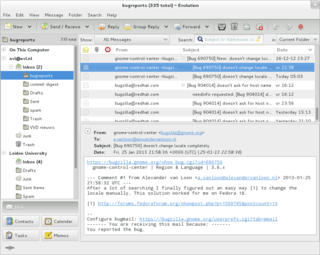
Email is a method of transmitting and receiving messages using electronic devices. It was conceived in the late–20th century as the digital version of, or counterpart to, mail. Email is a ubiquitous and very widely used communication medium; in current use, an email address is often treated as a basic and necessary part of many processes in business, commerce, government, education, entertainment, and other spheres of daily life in most countries.

An email client, email reader or, more formally, message user agent (MUA) or mail user agent is a computer program used to access and manage a user's email.

The Maildir e-mail format is a common way of storing email messages on a file system, rather than in a database. Each message is assigned a file with a unique name, and each mail folder is a file system directory containing these files. Maildir was designed by Daniel J. Bernstein circa 1995, with a major goal of eliminating the need for program code to handle file locking and unlocking through use of the local filesystem. Maildir design reflects the fact that the only operations valid for an email message is that it be created, deleted or have its status changed in some way.
Mbox is a generic term for a family of related file formats used for holding collections of email messages. It was first implemented in Fifth Edition Unix.
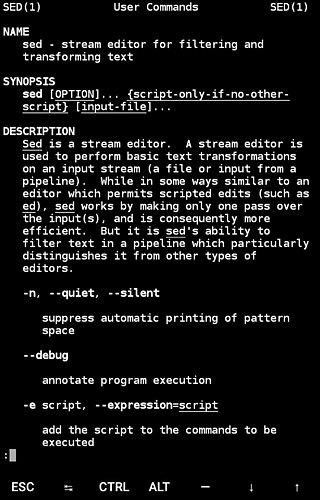
A man page is a form of software documentation usually found on a Unix or Unix-like operating system. Topics covered include computer programs, formal standards and conventions, and even abstract concepts. A user may invoke a man page by issuing the man command.
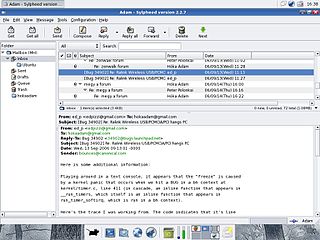
Sylpheed is an open-source e-mail client and news client licensed under GNU GPL-2.0-or-later with the library part LibSylph under GNU LGPL-2.1-or-later. It provides easy configuration and an abundance of features. It stores mail in the MH Message Handling System. Sylpheed runs on Unix-like systems such as Linux or BSD, and it is also usable on Windows. It uses GTK+.
Bogofilter is a mail filter that classifies e-mail as spam or ham (non-spam) by a statistical analysis of the message's header and content (body). The program is able to learn from the user's classifications and corrections. It was originally written by Eric S. Raymond after he read Paul Graham's article "A Plan for Spam" and is now maintained together with a group of contributors by David Relson, Matthias Andree and Greg Louis.
procmail is an email server software component — specifically, a message delivery agent (MDA). It was one of the earliest mail filter programs. It is typically used in Unix-like mail systems, using the mbox and Maildir storage formats.

CUPS is a modular printing system for Unix-like computer operating systems which allows a computer to act as a print server. A computer running CUPS is a host that can accept print jobs from client computers, process them, and send them to the appropriate printer.
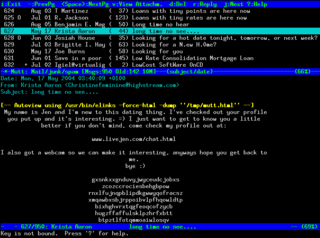
Mutt is a text-based email client for Unix-like systems. It was originally written by Michael Elkins in 1995 and released under the GNU General Public License version 2 or any later version.
The MH Message Handling System is a free, open source e-mail client. It is different from almost all other mail reading systems in that, instead of a single program, it is made from several different programs which are designed to work from the command line provided by the shell on Unix-like operating systems. Another difference is that rather than storing multiple messages in a single file, messages each have their own separate file in a special directory. Taken together, these design choices mean that it is very easy and natural to script actions on mail messages using the normal shell scripting tools.
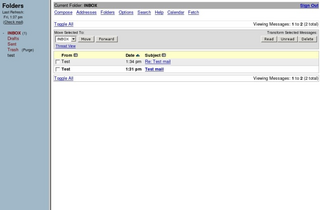
SquirrelMail is a project that aims to provide both a web-based email client and a proxy server for the IMAP protocol.

Larry Ewing is an American computer programmer who is known as the creator of the Linux mascot, Tux. The artwork was created in 1996, while Ewing was a student at Texas A&M University, originally as a submission for a contest to create the Linux logo. Though Ewing's submission didn't win, his artwork was adopted as the Linux "brand character". Ewing also created the Ximian and Mono monkey logos and is involved in:
The UW IMAP server was the reference server implementation of the Internet Message Access Protocol. It was developed at the University of Washington by Mark Crispin and others.

Linux is a generic name for a family of open-source Unix-like operating systems based on the Linux kernel, an operating system kernel first released on September 17, 1991, by Linus Torvalds. Linux is typically packaged as a Linux distribution (distro), which includes the kernel and supporting system software and libraries, many of which are provided by the GNU Project.

Claws Mail is a free and open-source, C/GTK-based e-mail client, which is both lightweight and highly configurable. Claws Mail runs on both Windows and Unix-like systems such as Linux, BSD, and Solaris. It stores mail in the MH mailbox format. Plugins allow to read HTML mail, but there is none to compose HTML messages.

GNUMail is a free and open-source, cross-platform e-mail client based on GNUstep or Cocoa. It is the official mail client of GNUstep and is also used in Étoilé. It was inspired by NeXTMail, the predecessor of Apple Mail. GNUMail is based on the mail handling framework Pantomime. GNUMail demonstrated that it is possible to develop cross platform programs for GNUstep and Cocoa.
Qpopper was one of the oldest and most popular server implementations of POP3. As a free and open-source server distributed under BSD style license, it was a common choice for Internet Service Providers, schools, corporations, and other organizations. It was included in several Linux and Unix distributions.
The following outline is provided as an overview of and topical guide to the Perl programming language: